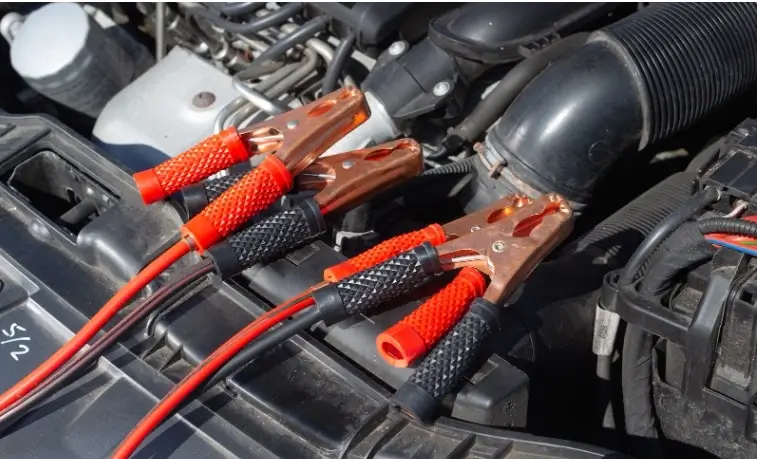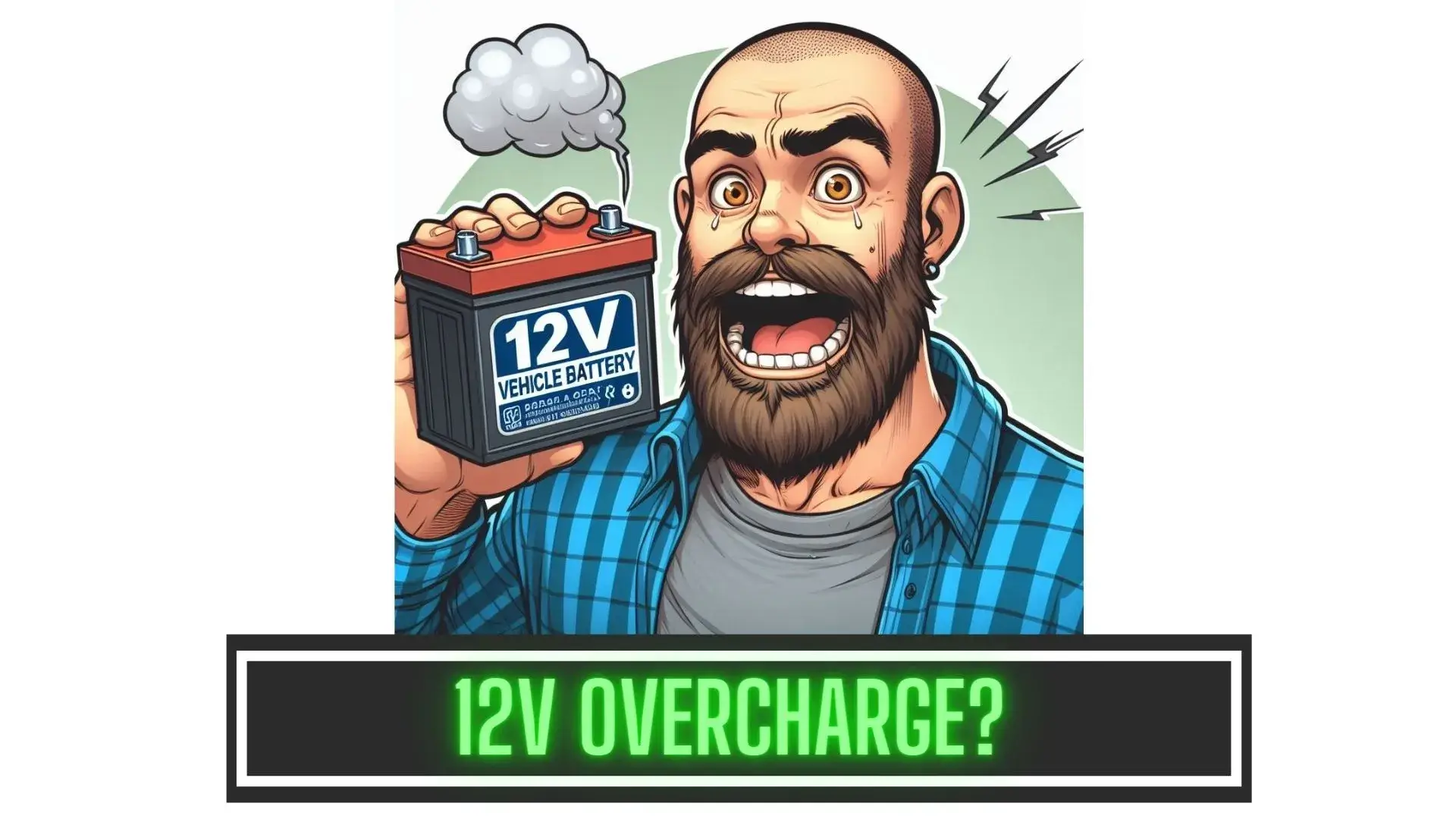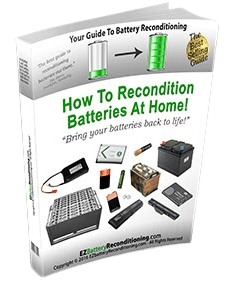Can You Overcharge a 12-volt Battery? Essential Tips to Avoid the Risks and Consequences of Overcharging. Find Out How!
Do you love your 12-volt battery but hate overcharging it? Same here!
Overcharging a battery can have dire consequences. They include decreased efficiency, shortened life, and even an explosion. I understand how you feel because I used to struggle with the same issue. I was always unsure of how long to charge my battery and what kind of charger to use for my battery. But then I discovered how to avoid overcharging and preserve my battery.
So, can you overcharge a 12-volt battery? The answer is yes, you can. But it’s not that simple. The risks and possibilities of overcharging a battery vary depending on a number of factors. These include the type of battery, the type of charger, and the voltage involved.
In this post, I will show you what these factors are. I will explain how they influence overcharging. I’ll also explain how you can avoid the nightmare of overcharging your 12-volt battery. Read on to find out more.
Here we go!
| Prevention Tip | Details |
|---|---|
| Use a smart charger | Automatically adjusts voltage to prevent overcharge |
| Use a maintenance charger | Provides continuous low current to maintain charge |
| Follow manufacturer guidelines | Consult the manual for proper charging instructions |
| Monitor charging time | Don’t leave the battery on charge for extended periods if it’s not a smart charger. |
| Check voltage | Use a multimeter to monitor the battery voltage |
Table of Contents
Key Takeaways
- Understand what overcharging is and how it can damage a 12-volt battery
- Be aware of common causes for battery overcharging and how to prevent it
- Learn how to detect if your battery has been overcharged and what to do in that situation
Can You Overcharge a 12-volt Battery – What is Overcharging?
Let me explain.
Definition and Risks
Overcharging is when a battery receives more voltage than it can handle. It can lead to some pretty serious problems. For instance, an overcharged battery can get damaged or even explode. The risks are real, and we should avoid them, right?
The damage to an overcharged battery is mainly due to excessive heat and gas production. These can ruin the battery’s internal components. In some cases, it may even cause a fire.
How Overcharging Can Occur
So, how does overcharging happen? Let’s get into the reeds!
It usually happens when you use the wrong charging equipment. Or if you don’t follow the correct charging procedures. If the voltage regulator in a car’s charging system fails, the battery can overcharge.
Another potential cause is forgetting to unplug a charger. This leaves your battery hooked up for too long, and if you are using an old-style charger, it can have unwanted consequences.
Overcharging is not something we can ignore. With the right information and precautions, we can prevent it from happening. We can keep our batteries safe.
Common Causes of Overcharging
What should you avoid to protect your battery?
Incorrect Voltage or Amperage
One cause of overcharging a 12-volt battery is using a charger with the wrong voltage or amperage. Charging a battery with too much voltage or current can overcharge it.
For example, using a 24-volt charger on a 12-volt battery will more than likely cause an overcharge. This could damage the battery. And that’s bad news, right?
Faulty or Incorrect Charger
A faulty charger is another potential cause of overcharging. A charger that isn’t operating properly might not regulate the charging process correctly. This can lead to it supplying too much current to the battery. Before you know it, you have a damaged and overcharged battery.
Charging for Too Long/Frequently
Charging a battery for too long or too frequently can also lead to overcharging. Leaving a battery connected to a charger for an extended time can overcharge the battery. Even when it’s already fully charged. Additionally, charging the battery when it doesn’t need it can morph into overcharging.
High Temperature/Weather
And here’s another thing: Heat lowers the internal resistance of lead-acid batteries, making the electrolyte more conductive and reducing the electrodes’ polarization. However, this does not mean that heat improves the battery’s performance, as it also accelerates the chemical reactions and causes degradation and self-discharge.
So, if you live in the southwestern desert … be extra careful.
How to Tell if Overcharged
So, what are the telltale signs of an overcharged battery? I was coming to that!
Signs and Symptoms
If a 12-volt battery is overcharged, you might notice a few things. The battery could become hot to the touch or even start to overheat. When this happens, it can be dangerous and lead to battery damage or even an explosion.
You should also keep an eye out for swelling or a strong odor coming from the battery. If you notice these, disconnect the charger immediately and allow the battery to cool down.
Using a Multimeter to Test
But how do we know if we have definitely overcharged our battery? Is there a way to measure it? Well, yes.
I use my multimeter to check if a battery is truly overcharged. It’s a simple and accurate way to measure the battery voltage. Here’s how:
- Set the multimeter to its DC voltage setting (usually indicated by a “V” with a straight line).
- Connect the red probe to the battery’s positive (+) terminal and the black probe to the negative (-) terminal.
- Read the display on the multimeter.
A fully charged 12-volt battery should show a voltage reading of between 12.6 and 12.8 volts. If the reading is higher, it’s possible the battery is overcharged. So, keep an eye on those numbers when testing your battery. Remember, safety comes first!
How to Prevent Overcharging
How do you stop overcharging from happening in the first place? Let’s check out some mitigations.
Tips for Preventing Overcharging
To prevent overcharging a 12-volt battery, the best thing you can do is use a smart charger. A smart charger adjusts the charge voltage depending on the battery’s state of charge. This means it’s almost impossible to overcharge using modern smart chargers. Neat, huh?
Another tip is to use a maintenance charger. Maintenance chargers maintain a battery’s charge by supplying a slow, continuous current that cuts off on a full charge. This way, you can safely leave your battery connected for an extended period. You don’t have to worry about overcharging.
Some other helpful tips include:
- Monitoring the charging process
- Disconnecting the charger once the battery is fully charged
- Following the manufacturer’s recommended charging guidelines
- Using a charger with a built-in overcharge protection feature
Maintaining Battery Health
To keep my battery in good shape, I always take the time to maintain it. Regularly checking and cleaning the battery terminals prevents corrosion and improves electrical conductivity.
Remember I mentioned that extreme temperatures are problematic? Well, I make it a point to keep the battery in a cool, dry place. High temperatures can damage internal components. They can also reduce the battery life.
Another tip is to avoid deeply discharging the battery. This can shorten its lifespan. A battery management system can help monitor and maintain the battery’s health.

What to Do if Overcharged
Think that you already overcharged your battery? Don’t worry, I can help with that.
Steps to Take
If you find yourself in a situation where your 12v lead-acid battery is overcharged, do not panic. Here are my tips on what to do to prevent or mitigate overcharge.
Use the correct charger for your battery type and size: Make sure the charger has a smart feature that stops charging when the battery is full.
Check the voltage and electrolyte levels of your battery regularly. Use a voltmeter to measure the voltage and a hydrometer to measure the specific gravity of the electrolyte. If the voltage is too high or the electrolyte is too low, your battery may be overcharged.
Disconnect and cool the battery if it is overcharged. Remove the battery from the charger and place it in a well-ventilated area. Avoid any sparks or flames near the battery, as it may release flammable gases.
Recondition the battery if it is overcharged. This involves draining the battery completely and then recharging it slowly with a low current. This can restore the battery’s capacity and performance.
Replace the battery if it is severely overcharged or damaged. If the battery is swollen, cracked, leaking, or corroded, it may not be safe or effective to use. You may need to buy a new battery and dispose of the old one properly.
If you are unsure, have your battery checked by a professional mechanic. They can diagnose the issue and recommend the most appropriate actions to take. Your mechanic may advise you to replace the battery if the cells are damaged beyond repair.
As well as your local indie mechanic, most auto parts stores like Pep Boys, Advance Auto Parts, O’Reilly, NAPA Auto Parts will test and diagnose your battery free of charge.
Troubleshooting and Fixing
In some cases, you might be able to fix the issue by adjusting the charging source. For example, you can adjust a solar panel to prevent overcharging the battery. It’s important the charging voltage does not exceed 15 volts. Higher voltages can lead to electrolysis and damage the battery cells.
Remember, it’s always better to be safe than sorry when dealing with batteries. Taking these steps can help you avoid serious damage. It can also help keep your battery run smoothly for years to come.

Before You Go…
If you’ve got this far, you’ve learned how to prevent overcharging your 12-volt battery and keep it in optimal condition. But do you know how your charger works and how it knows when your battery is full?
This is an important question. Using the wrong charger or charging method can damage your battery. It can also reduce its performance.
If you want to learn more, read my next article: “How Does a Charger Know When a Battery is Full?” It will explain the science behind charging. It will also cover the different types of chargers available. You don’t want to miss this.
Frequently Asked Questions
Here’s the FAQs
How does overcharging affect a car battery?
When a car battery is overcharged, it can cause damage. Overcharging can lead to the battery overheating and its internal components breaking down. The electrolyte may also evaporate, causing a decrease in the battery’s capacity. So, monitoring your battery’s charging and avoiding overcharging it is vital.
What are the risks of using a trickle charger for too long?
Using a trickle charger for an extended period may lead to overcharging. The risk increases if the charger doesn’t have an automatic shut-off feature. Overcharging can damage the battery and shorten its lifespan. It is important to use a compatible charger. Also, follow the manufacturer’s guidelines for safe charging practices.
Can charging a battery at 2 amps lead to overcharging?
Charging a 12V battery at 2 amps is a slow charging process, which is generally safe. But, it’s not impossible to overcharge a battery this way if left connected for an extended time. To avoid overcharging, use a charger with an automatic shut-off feature. Or, monitor the process and disconnect it once fully charged.
What happens when a deep-cycle battery is overcharged?
When a deep-cycle battery is overcharged, it can damage its internal components. Overcharging can cause a build-up of gas inside the battery. This could lead to an explosion. Additionally, the battery capacity may decrease, shortening its lifespan. To maintain your deep cycle battery’s health, use a charger designed for these types. Follow proper charging practices.
Do solar panels pose a risk of overcharging a car battery?
Solar panels can overcharge a car battery if there’s no charge controller in the system. A charge controller acts as a regulator. It prevents overcharging by limiting the current and voltage sent to the battery. Use a solar panel system with a charge controller to guarantee your car battery charges safely.
Is it safe to leave a 12V battery charging overnight?
A 12V battery can be left charging overnight if you’re using a smart charger. Such chargers can monitor the battery’s state and prevent overcharging. But, charges without automatic shut-off features may pose a risk. Always follow the manufacturer’s guidelines, and if possible, use a smart charger.
Related Articles
- How Many Volts Does a 12-Volt Battery Need to Start a Car? How to Avoid Getting Stranded on the Road
- Battery Charger vs Battery Maintainer? Learn the Difference Now!
- The common causes of battery failure – 5 Surprising Reasons Revealed
- How to Master Battery Charger Safety Guidelines for Commercial Use in 9 Easy Steps


